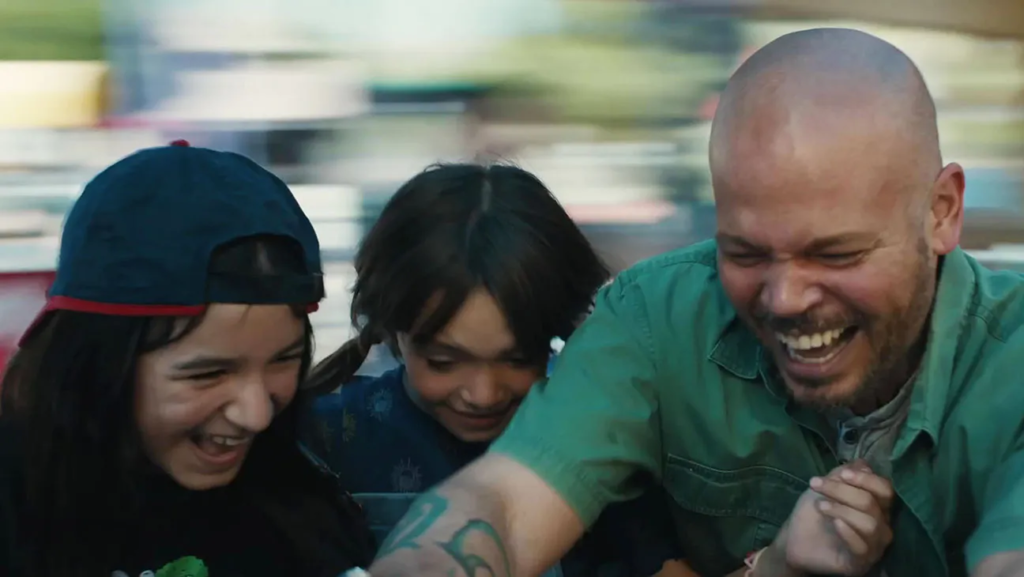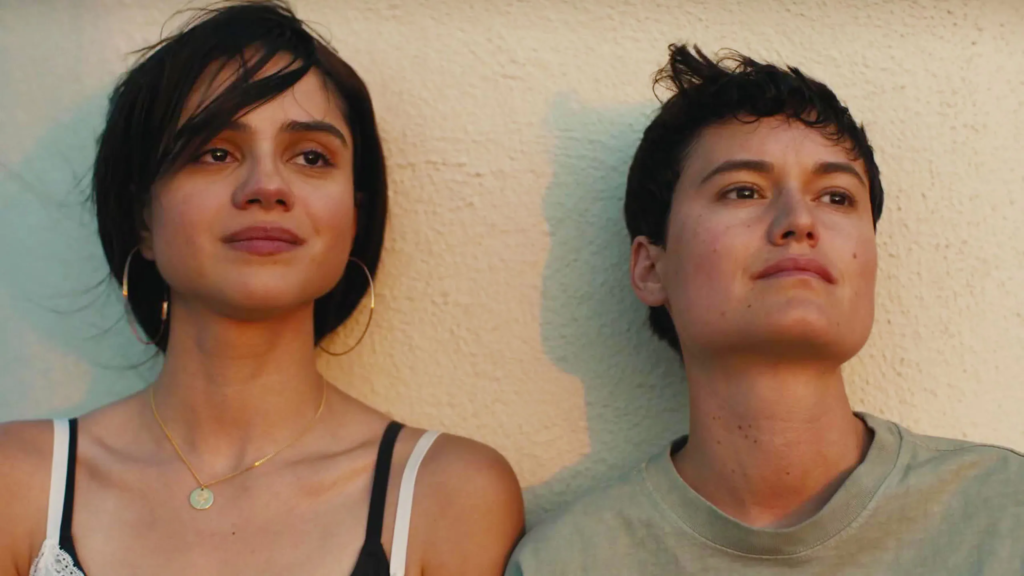Director: Alessandra Lacorazza Samudio
Writer: Alessandra Lacorazza Samudio
Stars: Residente, Sasha Calle, Lio Mehiel
Synopsis: On a journey that spans the formative years of their lives, two sisters navigate their loving but volatile father during their yearly summer visits to his home in Las Cruces, New Mexico.
In the Summers is a personal debut feature inspired by the director Alessandro Lacorazza own relationship with their father and sister. Vicente (René Pérez Joglar a.k.a. Residente) is a fractured and damaged man creating complex legacies he passes on to his children- legacies which were probably passed on to him. His masculinity, as defined by class, place, ethnic background, opportunity, and the feeling that something unfair happened to him at some point is of particular interest.

The film begins and ends in the same airport in Las Cruces, New Mexico and is given chapters resonant of Dutch still life and memento mori painting to show how time passes. The first chapter features Vicente nervously waiting to pick up his daughters Violeta and Eva. He’s been cleaning the house left to him by his mother. He’s jangling with excitement to show them the swimming pool and make this summer, his first after losing custody rights with his Californian ex-wife, the best he can for the girls. Bubbly young Eva (Luciana Quiñonez) clearly adores him. The slightly older Violeta (Dreya Castillo) is more aware of what has really happened between her parents for Vicente to lose visitation rights and is less forgiving. However, his enthusiasm manages to win them over — albeit in small and unsustainable doses.
Vicente is battling addiction, primarily alcoholism, although harder drugs turn up. He loves his kids, but he can’t be a reliable dad. In fact, he’s often a terrible dad. His focus on proving that he is smarter than he feels people give him credit for merges in with his general resentment and discontent and spills over to his kids at different points in their formative years. Vicente is so profoundly stuck in his own spirals he cannot see the intensity of his instability. The greatest tragedy is that he is clever, he does love his children, but in almost every interaction he has with them there is always a passenger – his alcoholism. A night spent stargazing with Violeta and Eva would be perfect without the six pack of beer next to him. A birthday party is a trial by fire for Violeta and Eva.
At first, he’s trying to win over Violeta, someone who is smart but “not pretty.” He seems to miss the part where Violeta is clearly dealing with gender and sexuality issues, something his long-term friend Carmen (Emma Ramos) picks up on immediately. Carmen is the other parent for Eva and Violeta in Las Cruces. When Vicente is too far gone, she is the one the siblings turn to. Carmen’s weary eyes tell a story of life-long care for Vicente but with no illusions he is more than he is. Something a child learns over time – for Eva perhaps more slowly than Violeta.
Eva reminds Vicente of her mother. He sidelines her for being “stupid” and not caring about mathematics and science like he and Violeta do. Yet Eva’s adoration for Vicente is ritually self-punishing as she gets older. As she enters her teen years (played with heartbreaking authenticity by Allison Salinas) she has no idea who she needs to be to make Vicente proud of her.

The siblings must find a way to keep their own bond alive while dealing with a man who could embrace them or hurt them – possibly both in the space of a conversation. The beauty of Lacorazza’s script is that although Violeta and Eva’s relationship with Vicente is shifting, their sibling solidarity rarely does. From the child Eva helping Violeta to cut off her hair with paper scissors, to the teen Violeta putting herself in the line of fire to protect Eva.
By the second summer the clean house and the once fresh swimming pool are dirty and filled with muck. V (Kimaya Thais Limon) is more confident in their identity. V experiences their first crush on Vicente’s student Camila (played at two ages by Gabrielle Surodjawan and Sharlene Cruz). Ava begins to fade into the background except when Vicente makes remarks about her appearance.
An accident that was always going to happen, does. Vicente has now done real physical damage as well as psychological damage to his kids.
By the third summer, V doesn’t turn up. Only Ava, and she is watching Vicente with a new partner, Yenny, and a new daughter. If things seemed to be terrible the previous filmed summer, they are worse now. Yenny (Leslie Grace) is obviously an addict. The house is in squalor and Vicente is not working. The baby Natalia is often left to cry, and Ava quietly moves into the position of caregiver to Natalia, Yenny, and Vicente. Otherwise, she drifts alone through the streets of La Cruces which are showing the wear of neglect.
The final summer brings together the now adult V (Lío Mehiel) and Eva (Sasha Calle). Vicente is finally sober and the sole parent to Natalia (Indigo Montez). But Ava is struggling with her own version of addiction and self-destruction. V realizes that, they too, have not avoided Vicente’s influence. Some of it has been positive, a lot of it negative. They all love each other but it is too late to undo what has been done.
René Pérez Joglar Is excellent as the mercurial Vicente. Someone whose promises just don’t mean anything. Not the promise he showed in his youth, or the promise that next time it will be better. Perhaps he really has a chance to get things right with Natalia – perhaps this time he will go back to school, and he will stay sober. Lacorazza doesn’t answer the question, what they do answer is that V, Eva, and Vicente have reached a point of melancholic acceptance. No matter how much you love someone you can’t ignore their flaws, especially when they can become fatal on the spin of a dime.
Alessandra Lacorazza is never patronizing their characters. They are observing them with compassion and clarity. Just as they are not damning New Mexico — but showing both its cosmic and otherworldly beauty as well as the poverty and shuttered businesses. Alessandra Lacorazza also looks at Latine tradition with each chapter essentially opening with an altar of memories which show how time is passing. How every member of the family has value and how all the small mementos as well as the searing events mean something.
The memories of a bar where they play pool, how to break an egg to make an omelette, or the position of the stars, intermingle with seeing a parent passed out soaked in their own piss, or a violent shove. A dance which is not joyous but aggressive, and one that is just heartbreaking.
Rich with detail, In the Summers explores Latine and queer identity but doesn’t dwell on either being anything but who the people are; it is no huge burden or shame for the siblings. If there is any shame it is what Vicente carries as he falls into machismo lashing out as he has potentially had no healthy male connections in his life.
In the Summers is as tender as it is a powder keg. The siblings learn they can’t please someone who doesn’t know what they really want even if that was to please them. Beautifully acted and expertly shot by Alejandro Mejia, Alessandra Lacorazza’s emotionally raw feature aches with authenticity. In the Summers is a legacy of love in all its vicissitudes.





